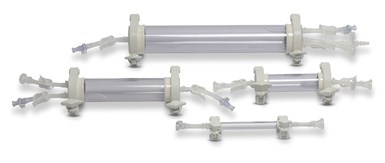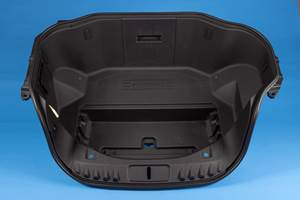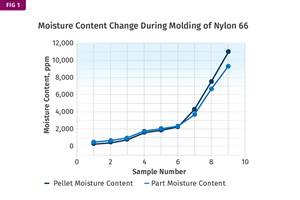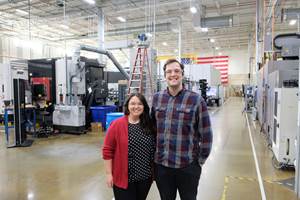PSU Outperforms PC in Sanitary Biotech Sight Gauge
Manufacturer of single-use systems for biotech applications opts for PSU over PC for improved heat and chemical resistance.
Polysulfone (PSU) is being used to manufacture customized tri-clamp sight gauges for bioprocessing applications by SaniSure, Camarillo, Calif., after trials showed it outperformed polycarbonate. A global company that provides novel single-use fluidic systems and components for drug and vaccine manufacturing and other biotech applications, SaniSure opted for transparent Udel P-1700 PSU resin from Solvay Specialty Polymers to achieve superior strength, transparency, heat resistance, hydrolytic stability and retention of mechanical properties under steam sterilization.

High-temperature stability and excellent chemical resistance are claimed for SaniSure’s new tri-clamp sight gauges made from Udel P-1700 PSU.
SaniSure’s capabilities include thermoplastic and thermoset extrusion, molding, assembly and fabrication. Examples of its products include single-use assemblies, bottles, tubing, fittings and fabrications.
In addition to transparent Udel P-1700 PSU, which is extruded into the single-use tubular sight gauges, SaniSure chose an opaque, white grade of Udel PSU for the connection between the sight gauge and the tubing used in various critical bioprocessing applications. This product is injection overmolded onto the sight gauge where a hygienic gasket is affixed with a mechanical clamp. These materials are free of any animal-derived components (ADCF) and meet USP Class VI and ISO 10993 requirements for biocompatibility.
Robert DuPont, SaniSure’s product development manager, considers Udel P-1700 PSU to be a major breakthrough for the pharmaceutical industry. “One key factor in choosing Udel P-1700 PSU resin is the rigorous regulatory testing done by Solvay, particularly for extractables and leachables under the BioPhorum Operations Group (BPOG) standard. Solvay has taken a lead in providing this data to its customers. Based on the exceptional performance of Udel PSU resin and our productive collaboration with Solvay, we are planning to expand the use of this material into novel products currently under development,” DuPont notes.
According to DuPont, PC was initially considered for the product, but it did not perform well in the test applications due to several limitations, including susceptibility to stress cracking and hazing, and a lack of chemical compatibility with clean-in-place (CIP) chemicals commonly used in biopharma applications. Says DuPont, “After several extensive trials, we found Solvay’s Udel PSU to be superior for our application. A few notable properties of the material are its high-temperature stability (240 F) and excellent chemical resistance. It is also widely used in other biopharma products and has a solid track record in the industry.”
DuPont notes that SaniSure has developed many proprietary methods for processing PSU over several decades and has an extensive variety of specialty processing equipment for PSU materials, which drastically accelerated the development process for this product. He noted that the Udel PSU also enabled the creation of a smooth wall, which is critical for the transparency of the product, as well as for consistently maintaining the large outside diameters required.
DuPont adds that due to the application’s critical nature, SaniSure deemed it important to use the very best available materials. “Thus, cost was not a highly significant factor in the design process. The cost of the material used in a product like this tends to be a relatively small part of the overall cost. This is due partly to the extensive quality-control and quality-assurance procedures involved in producing the product. However, Solvay’s Udel PSU does facilitate a highly efficient manufacturing process with very few rejects.”
Related Content
Automotive Awards Highlight ‘Firsts,’ Emerging Technologies
Annual SPE event recognizes sustainability as a major theme.
Read MoreWhat's the Allowable Moisture Content in Nylons? It Depends: Part 2
Operating within guidelines from material suppliers can produce levels of polymer degradation. Get around it with better control over either the temperature of the melt or the barrel residence time.
Read MoreScaling Up Sustainable Solutions for Fiber Reinforced Composite Materials
Oak Ridge National Laboratory's Sustainable Manufacturing Technologies Group helps industrial partners tackle the sustainability challenges presented by fiber-reinforced composite materials.
Read MoreThe Fantasy and Reality of Raw Material Shelf Life: Part 1
Is a two-year-old hygroscopic resin kept in its original packaging still useful? Let’s try to answer that question and clear up some misconceptions.
Read MoreRead Next
See Recyclers Close the Loop on Trade Show Production Scrap at NPE2024
A collaboration between show organizer PLASTICS, recycler CPR and size reduction experts WEIMA and Conair recovered and recycled all production scrap at NPE2024.
Read MoreLead the Conversation, Change the Conversation
Coverage of single-use plastics can be both misleading and demoralizing. Here are 10 tips for changing the perception of the plastics industry at your company and in your community.
Read More




















